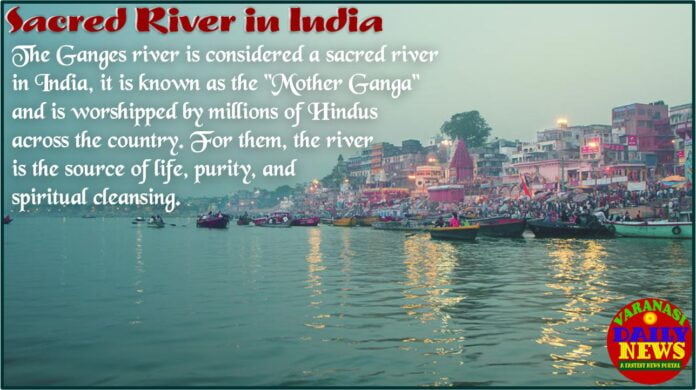Varanasi, also known as Kashi, is one of the oldest and most sacred cities in India, situated on the banks of the holy River Ganges. For centuries, the Ganges has been the lifeline of Varanasi, providing water for irrigation, transportation, and religious ceremonies. However, with rapid industrialization, urbanization, and population growth, the river is now facing severe pollution problems, posing a serious threat to human health and the environment. Varanasi’s Ganga: A Lifeline and a Source of Pollution
Read Also : Varanasi’s Regeneration: A Look at the City’s Urban Renewal Plans
Sacred River in India

The Ganges river is considered a sacred river in India, it is known as the “Mother Ganga” and is worshipped by millions of Hindus across the country. For them, the river is the source of life, purity, and spiritual cleansing. The river is also the source of livelihood for thousands of fishermen and boatmen who depend on it for their daily bread. Varanasi’s Ganga: A Lifeline and a Source of Pollution
Central Pollution Control Board
However, due to the large number of industries and factories located in and around the city, the Ganges has become a dumping ground for toxic chemicals and human waste. According to a study conducted by the Central Pollution Control Board, the river is contaminated with high levels of heavy metals, pesticides, and bacteria, making it unfit for human consumption and contact. Varanasi’s Ganga: A Lifeline and a Source of Pollution
Visit at : Exploring Transportation Options for Varanasi’s Airport and Famous Temples
Increasing Population

The city’s rapid urbanization has also contributed to the pollution of the Ganges. With the increasing population, the city’s sewage treatment plants are insufficient to treat the huge volume of sewage generated every day, resulting in the direct discharge of untreated sewage into the river. Open defecation along the riverbank and the burning of garbage further add to the pollution. Varanasi’s Ganga: A Lifeline and a Source of Pollution
Read Also : Life at the Banks of the Sacred Ganga in Varanasi
The Pollution of the Ganges
The pollution of the Ganges poses a serious threat to human health and the environment. Contaminated water leads to the spread of water-borne diseases like cholera, hepatitis, and typhoid. The toxic chemicals present in the water can also cause cancer, liver damage, and respiratory problems. The polluted river also affects the aquatic life, destroying the fish population and causing harm to smaller microorganisms. Varanasi’s Ganga: A Lifeline and a Source of Pollution
Visit at : Exploring the Ancient City of Varanasi: A Comprehensive Guide
Namami Gange Project
Efforts to clean up the river have been made by the government, NGOs, and local communities. The government has launched the Namami Gange project, a comprehensive initiative to revive and rejuvenate the Ganges. Varanasi’s Ganga: A Lifeline and a Source of Pollution
The project includes measures to reduce pollution, improve water quality, and promote sustainable sanitation. Several NGOs and local communities have also started their own initiatives to clean up the river, such as setting up composting toilets and promoting environmentally friendly practices. Varanasi’s Ganga: A Lifeline and a Source of Pollution
Read Also : Discovering the Rich History of Varanasi’s Most Iconic Landmarks

Conclusion
In conclusion, the Ganges river is an integral part of Varanasi’s culture, history, and tradition. It is not only a lifeline, but also a source of pollution. Urgent action is required to prevent further deterioration of the river and to restore it to its pristine glory. Varanasi’s Ganga: A Lifeline and a Source of Pollution
This requires the combined efforts of the government, civil society, industries, and local communities. The restoration of the Ganges is not just about cleaning a river, but about preserving a way of life and a vital source of sustenance for generations to come. Varanasi’s Ganga: A Lifeline and a Source of Pollution







